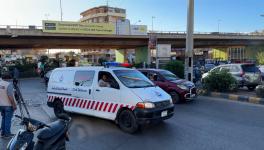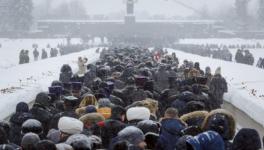Two Years on, Hope For Justice in Beirut Port Blast Fading
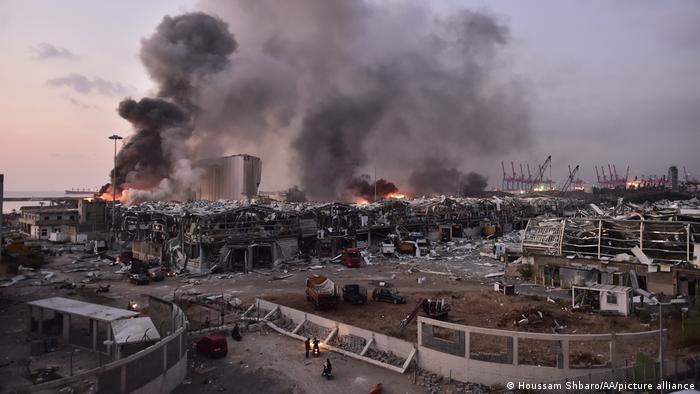
It has been two years since the explosion killed over 200 and demolished the port and surrounding neighbourhoods in Beirut.
The timing couldn't have been worse. Just a few days ahead of the second anniversary of the Beirut port explosion, which killed 216 people, injured 6,000 and shattered the homes of some 300,000 people in the surrounding neighborhoods, part of the northern grain silos gave in and collapsed with a loud crash.
Only this time, nobody was killed.
But the sound resembled an explosion, and together with the smoke and the fire, it rekindled the trauma caused when 2,750 metric tons (3,031 US tons) of unsecured ammonium nitrate detonated at the port on August 4, 2020.
"I don't feel that two years have passed at all," William Noun in Beirut told DW after the latest collapse. He lost his brother Joe Noun in the 2020 explosion. "I still feel the same heartbreak as the first day," he added.
The collapse of the 50-meter (164 feet) high silos came after a weeks-long fire triggered by grains that had fermented and ignited in the summer heat. In an interview with DW in Beirut, Lebanon's Minister of Public Works and Transport Ali Hamieh, who is in charge of the port, rejected accusations that the government had failed to take action when the fire broke out three weeks ago.
"Experts told us that is impossible to take the wheat out due to the fragile structure of the silo," Hamieh said, adding that the government will still try to preserve the more secure parts of the remaining structure.
Survivors wanted to hold on to silos as a memorial
The silos, which had shielded parts of Beirut during the 2020 blast, have stirred controversy. In April, the Lebanese government approved the demolition of the silos after a survey found they could collapse in the coming months.
But many survivors and families of the victims had argued that the silos could contain evidence for the judicial probe into the 2020 blast. Many also wanted the silos to remain as a memorial.
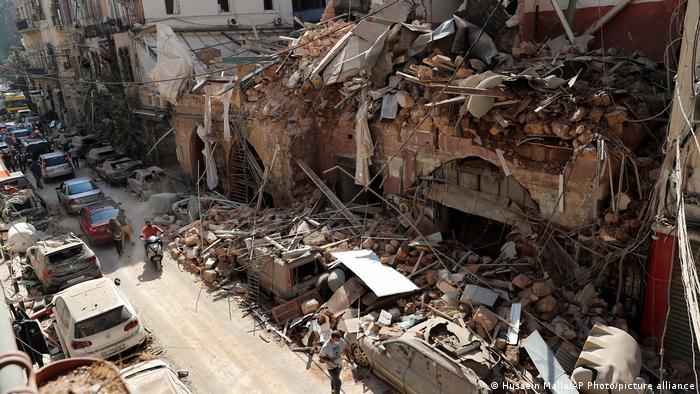
Two years after the blast, the Beirut port is still riddled with debris.
The 2020 blast is widely seen by many Lebanese as a symbol of corruption and cronyism by a ruling elite that has also driven the country into a devastating financial disaster.
Lebanon in throes of 'full collapse'
Economically, the Lebanese pound (also called lira) has been in free fall, with an inflation rate of up to 90%. In turn, large parts of the population have become impoverished, and as a result of the war in Ukraine, the wheat-importing country might also have to face a significant shortfall of the commodity in the near future.
"We are already seeing a long queue outside bakeries," Anna Fleischer, head of the Heinrich Böll Foundation's office in Beirut, told DW.
For her, it is obvious that Lebanon is not in the middle of a crisis but is experiencing a "full collapse," for which far-reaching reforms are needed and not "light cosmetic measures."
However, the political landscape in Lebanon would first need to change for citizens to regain some kind of trust in the ruling class.
"But on the second anniversary of the Beirut blast, the Lebanese crisis is worse, economically, politically and judicially," Mohanad Hage Ali, director of communications and fellow at the Malcolm H. Kerr Carnegie Middle East Center in London, told DW, and added that "politically, the 2022 elections resulted in a hung parliament, which is poised to increase delays in forming a new government, and perhaps even electing a new president."
He doubts the next Lebanese president would be interested in pursuing the port blast investigation at all. "The most likely candidate so far, Soleiman Frangieh, is protecting the former Lebanese Public Works and Transportation Minister Youssef Fenianos, who is wanted in the port blast investigation," Hage Ali said.
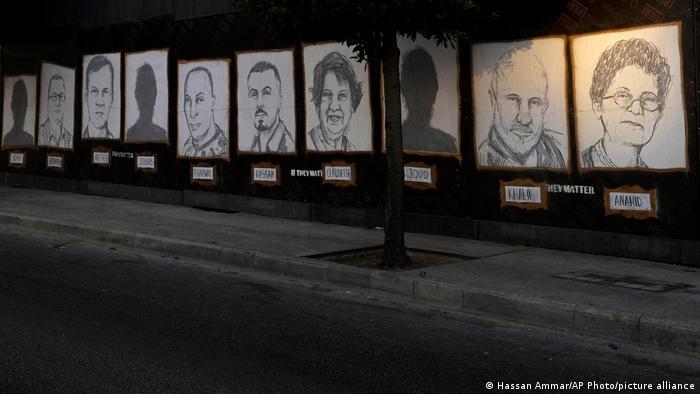
The families of the victims are close to losing hope that a probe will lead to justice
Probe plagued by allegations of obstruction
Over the past two years, the probe into the port blast has been dogged by allegations of systematic political obstruction. The country's strong political and military group Hezbollah and its allies have reportedly been on the forefront of efforts to derail the investigation.
Hage Ali fears that's unlikely to change. "As someone who spent a good number of years writing on the victims of Lebanon's civil war and their pursuit of justice and closure, I just can see stark similarities in the ongoing treatment of the victims and families of victims of the August 4 blast. The Lebanese political class remains closed, and unreformable," he told DW.
The first investigative judge, Fadi Sawan, was ousted after he charged then-caretaker Prime Minister Hassan Diab and three former ministers with "intentional killing and negligence that led to the deaths of dozens of people" following the port blast.
The investigation by the second judge, Tarek Bitar, has been on ice for the past eight months. Meanwhile, the country's Court of Cassation has decided that the court needs to fill several judge vacancies first. But the appointments need to be signed by the minister of justice and then approved by the minister of finance, who is closely linked with the parliamentary speaker Nabih Berri from the Hezbollah-ally Amal.
"For the future of the country, it is important to demand that the investigation will be resumed, and that Tarek Bitar is able to continue his work and publish his previous reports," Fleischer said.
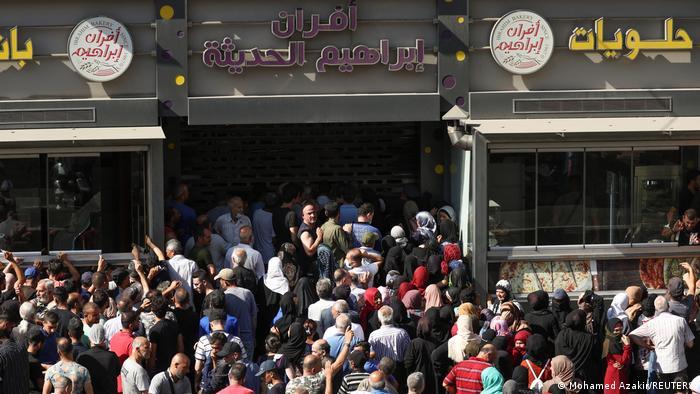
Sky-high inflation and wheat shortages have piled misery on an already suffering population in Lebanon
However, she is well aware of the fact that — even if Bitar were able to resume his investigation — he'd be able to proceed only within the limits that are set for him.
Still, she says, it "would be very, very important that he continues his work to show that there is interest in clarification at all."
'Two years full of pain and anger'
For survivors, hopes are fading for a full investigation into the events that led to the port catastrophe.
"The past two years have been full of pain and anger," Melvine Khoury, who suffered face and shoulder injuries in the blast, told DW.
She finds it hard to believe that "the people who are responsible for your pain are running in elections while you are in a hospital bed suffering after surgeries," she told DW in Beirut. Even two years after the explosion, she also still suffers heavily from trauma. "I witnessed the explosion but can't remember anything."
Human rights groups have kept up calls for an investigation into the blast. "Two years on the trauma, the effects are still broadly felt, since victims still don't have answers," Lama Fakih, Middle East and North Africa director at Human Rights Watch, told DW.
Fakih says it is hard to believe that none of the government officials like then-caretaker Prime Minister Hassan Diab have been held accountable. Yet, between 10 and 20 civilian port workers have been held in detention since the blast.
"They have no chance to defend themselves as long as the investigation is on hold," Fakih told DW. As things stand, she fears the "the situation will not change anytime soon."
Edited by: Sonia Phalnikar
Get the latest reports & analysis with people's perspective on Protests, movements & deep analytical videos, discussions of the current affairs in your Telegram app. Subscribe to NewsClick's Telegram channel & get Real-Time updates on stories, as they get published on our website.












